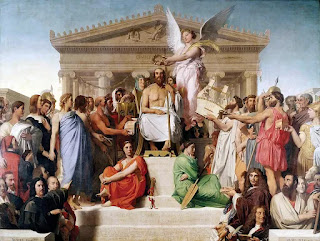When I read writings from the Middle Ages, or letters from the 1700s, or novels from the 1800s, I'm struck by how rich they were with references to the Greek and Roman classics. Even when I casually read magazine articles or watch black-and-white movies made a mere few generations ago, created not for professors but for regular mailmen, farmhands or construction workers, I’m struck by how liberally they are peppered with references to the people who created democracy, theatre, history, philosophy, and most of what we value today.
Even if you only watched football, you were expected to know classical references; the Yale football cheer for decades was “Brek-ek-ex Ko-ax,” which is simply nonsense unless you’ve read Aristophanes’ "The Frogs."
Children across the Western world once began their Latin lessons by reading Julius Caesar’s account of the wars in Gaul, beginning with the line “Gallia est omnis divisa in partes tres,” or “All Gaul is divided into three parts.” As scholar Wes Calliahan pointed out, this was so well-known that when "Cheaper by the Dozen" authors Frank Gilbreth and Ernestine Gilbreth Carey could begin their 1948 memoir with, “My father, like Gaul, was divided into three parts,” confident their readers understood.
Similar jokes appeared in short stories, Broadway musicals, even cartoons. Charles Addams – creator of the Addams Family – drew a cartoon of a pig teaching a Latin class, writing on the chalkboard “Alligay estay nis-omay ivisaday in artespay restay.” The cartoon had no caption to explain, for Addams could safely assume everyone got the joke – it was a pig teaching Latin in Pig Latin. And in those days everyone would have understood, just as their ancestors might have for centuries. Today, just decades later, not one person in ten thousand would understand.

No comments:
Post a Comment